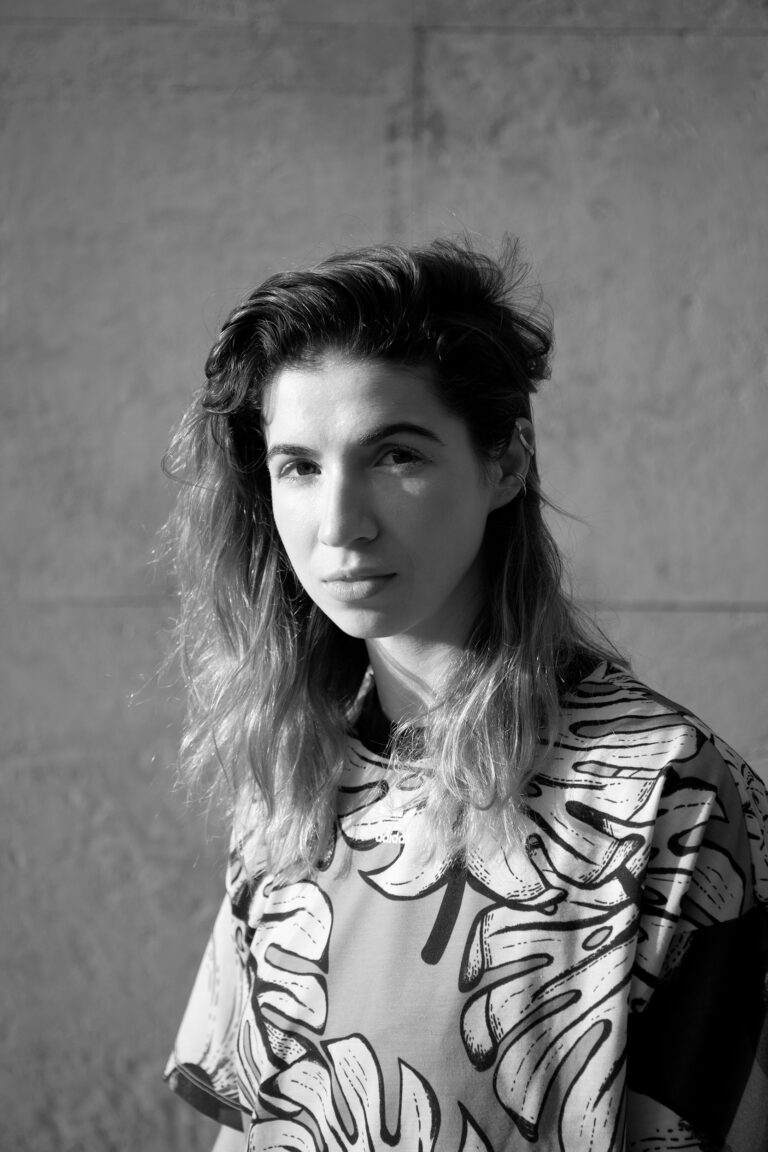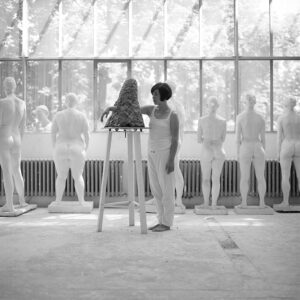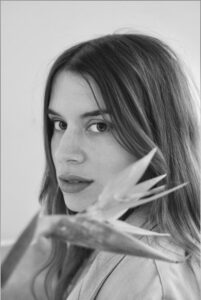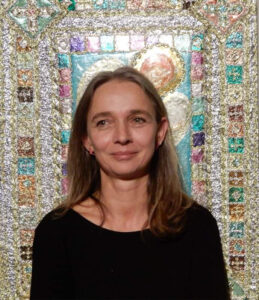Kristína Országhová

– born in 1992. From 2017 to 2019 She worked as a visual editor of the cultural and social magazine Kapitál [The Capital]. She studied artistic research at the Hogeschool voor de Kunsten Utrecht in the Netherlands. She was a coordinator for Slovakia of the author’s exchange within the East Art Mags platform. Now she is a co-organizing the Bratislava BAK Summer School, a summer school that focuses on socially and politically conscious art and artistic practice. Kristína Országhová deals with cultural theory, lectures and publishing, mainly in the Czech Republic and Slovakia. She exhibited in Kunsthalle Bratislava, tranzit.sk, in the New Synagogue in Žilina, or in bak (basis voor actuele kunst) in Utrecht, the Netherlands. Currently she is a postgraduate student in the field of Sociologyat Charles University in Prague, where she deals with the possibilities of combining artistic and sociological research and the transformation of gender identities in amateur boxing.
The art world sometimes scares me. I feel anxious about it. I try to run away from art all the time, only to find that the further I am receding from it, the closer I am finding myself. I perceive art as a mental space into which writers, scientists, philosophers, visual artists, anyone who indulges in essential inquiries can enter. It is a space where we can capture things just before they appear. A space in which we can rethink the ways we act and lead. For me, the creating of art is a commitment by which I can show that things can be different – and to reveal the ambivalence and complexity of life; not to try to squeeze it into explainable scenarios. My relationship with art is intimate.
I look for the tremulous feeling in my art. I crave for goosebumps. I am obsessed with the feeling of excitement, which raises in me by the question that art asks me about life. Although I often just guess those questions rather than knowing their exact wording. I am looking for art that disrupts the pattern of life, because the pattern is not living. I give in to the life. I feel its dirt and stickiness. The word is my tool but in every text is also a real body. Sometimes I can imagine a word coming out of my body and entering another’s body, it forms itself within the body. The body communicates as effectively as speech, but sometimes it seems to me that it does not deceive as much.
In my art exhibition practice, I am interested in collective work. Creation is a collective process for me. Creativity and inspiration come out of conversations with others. In 2017, we founded the Moho Kinship Society working group together with Magda Scheryová and Zuzana Jasenková. Our first artistic work was a project for the Poetry and Performance exhibition at the New Synagogue in Žilina1. The work itself is an installation of a fictional museum of the future, through which we rewrite the story of today’s extinct bird species from the Hawaiian Islands named Kauaʻi ʻōʻō. In this work, we claim to be this bird relatives and successors of his family. The exhibited work is the voice and sound of this little bird, of which we still have only a short recording of his singing from the eighties, when it was recorded for the last time. The work asks whether it is more important to know the truth or to keep hope.
The world is an ideological place. Therefore, as an artist I consciously choose the ideology that I spread through my actions. Everyone is choosing his/her own struggles. For me, one of the most important struggles today is the struggle of women, in which I find the basis for all my actions as well as artistic creation. However, this struggle is not a struggle of an individual. It is a fight against a system that has created the conditions for the oppression of women and other groups in society. Part of this system is also art, which does not exist outside of it, but is a kind of derivative from it. If this struggle is supposed to be consistent, it must be critical of art itself. I am not interested in political issues as a topic. Art with political themes often bores me. It does not excite me. It is important for me to create art politically though. To wonder why I deal with certain topics and not others. From what knowledge came the roots of my thinking? Who is given the credit and who remains invisible? Who is paid for his or her work and from whom is expected to do it voluntarily without a fee? I do not want my gender, ethnicity, nationality, or other affiliation to determine what topics I should or should not deal with, even though this is the current reality of many others. For me, equality means being able to freely choose what I want to pursue, regardless of the categories which purpose are to cram, limit and separate me from others. I want to touch others – to transcend each other, not just to rub against each other.
The text was written in collaboration with Denisa Tomková (2021).
1See: http://www.novasynagoga.sk/symposion-poezia-performancia/![]()
sa narodila v roku 1992. V rokoch 2017 – 2019 pôsobila ako vizuálna redaktorka kultúrno-spoločenského mesačníka Kapitál. Vyštudovala umelecký výskum na Hogeschool voor de Kunsten Utrecht v Holandsku. Za Slovensko koordinovala autorskú výmenu v rámci platformy East Art Mags. Je spoluorganizátorkou Bratislava BAK Summer School, letnej školy, ktorá sa zameriava na spoločensky a politicky uvedomelé umenie a umeleckú prax. Venuje sa kultúrnej teórii. Prednáša a publikuje najmä v Čechách a na Slovensku. Vystavovala v Kunsthalle Bratislava, tranzit.sk, v Novej Synagóge v Žiline, či v bak (basis voor actuele kunst) v holandskom Utrechte. V súčasnosti študuje doktorandské štúdium na Karlovej univerzite v Prahe v odbore Sociológia. Zaoberá sa možnosťami kombinovania umeleckého a sociologického výskumu a premenami rodových identít v amatérskom boxe.
Umelecký svet ma niekedy desí. Mám z neho úzkosť. Snažím sa pred ním a umením neustále utekať, len aby som zistila, že čím viac sa mu vzďaľujem, tým bližšie mu som. Umenie vnímam ako mentálny priestor, do ktorého môžu vstupovať spisovatelia a spisovateľky, vedci a vedkyne, filozofi a filozofky, vizuálni umelci a umelkyne, ktokoľvek, kto sa oddá bytostnému pýtaniu sa. Je to priestor, v ktorom môžeme zachytiť veci tesne predtým, ako sa objavia. Priestor, v ktorom môžeme nanovo premýšľať spôsoby nášho konania a vedenia. Tvoriť umenie je pre mňa záväzkom ukazovať, že veci môžu byť inak – odhaľovať ambivalenciu a zložitosť života; nesnažiť sa ho vtesnať do vysvetliteľných scenárov. Môj vzťah k nemu je intímny.
V umení hľadám ten pocit rozochvenia. Túžim po zimomriavkach. Som posadnutá pocitom vzrušenia, čo vo mne dokáže vyvolať otázka, ktorú mi umenie kladie o živote. Aj keď častokrát tie otázky skôr tuším, ako by som poznala ich presné znenie. Hľadám umenie, ktoré naruší vzorec života, lebo vzorec nie je žitie. Poddávam sa životu. Cítim jeho špinu a lepkavosť. Mojím nástrojom je slovo. V každom texte je však aj telo. Niekedy si predstavujem, ako slovo vychádza z môjho tela a vstupuje do tela druhého, tvorí sa spolu s telom. Telo komunikuje rovnako efektívne ako reč, avšak občas sa mi zdá, že klame omnoho menej.
V mojej výstavnej umeleckej praxi ma zaujíma kolektívna práca. Tvorba je pre mňa kolektívnym procesom. Tvorivosť a inšpirácie prichádzajú v rozhovoroch s druhými. V roku 2017 sme spolu s Magdou Scheryovou a Zuzanou Jasenkovou založili pracovnú skupinu Príbuzenstvo Moho. Naším prvým umeleckým počinom bol projekt pre výstavu Poézia a performancia v Novej Synagóge v Žiline1. Práca je inštaláciou akéhosi fiktívneho múzea budúcnosti, prostredníctvom ktorého prepisujeme príbeh dnes vyhynutého druhu vtáka z Havajských ostrovov menom Kauaʻi ʻōʻō. V tomto diele sa vyhlasujeme za jeho príbuzné a skrz nás jeho rod pokračuje. Vystavené dielo je hlasom a zvukom tohto malého vtáčika, z ktorého nám dodnes zostala len krátka nahrávka jeho spevu z osemdesiatych rokov, kedy bol poslednýkrát zaznamenaný. Dielo sa pýta, či je dôležitejšie poznať pravdu alebo si uchovať nádej.
Svet je ideologické miesto. Ako umelkyňa si preto vedome volím ideológiu, ktorú svojím konaním šírim. Svoje boje si každý vyberáme. Pre mňa je jedným z najdôležitejších bojov súčasnosti boj žien a v ňom zároveň nachádzam základ pre všetko svoje konanie ako aj umeleckú tvorbu. Tento boj však nie je bojom jednotlivca či jednotlivkýň. Je bojom proti systému, ktorý vytvoril podmienky pre utláčanie žien tak iných skupín spoločnosti. Súčasťou tohto systému je aj umenie, ktoré neexistuje mimo neho, ale je jeho akýmsi derivátom. Ak má byť tento boj dôsledný, musí sa teda kriticky stavať aj k umeniu samotnému. Politické otázky ma nezaujímajú ako téma umenia. Umenie s politickými témami ma častokrát nudí. Nevzrušuje ma. Dôležité je pre mňa tvoriť umenie politicky. Premýšľať, prečo sa istým témam venujem a iným nie. V akom poznaní sú korene môjho premýšľania? Komu je daný kredit a kto zostáva neviditeľný? Komu je za jeho či jej prácu zaplatené a od koho sa očakáva, že ju bude robiť dobrovoľne bez nároku na honorár? Nechcem, aby môj rod, etnická, národná či iná príslušnosť určovali, akým témam sa mám alebo nemám venovať, aj keď to je súčasná realita mnohých. Rovnosť pre mňa znamená môcť si slobodne vybrať, čomu sa chcem venovať, bez ohľadu na kategórie, ktorých účelom je ma vtesnať, limitovať a oddeliť od druhých. Túžim sa druhých dotýkať – navzájom sa prestupovať, nielen sa obtierať.
Text bol napísaný v spolupráci s Denisou Tomkovou (2021).
1Pozri: http://www.novasynagoga.sk/symposion-poezia-performancia/![]()


